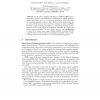22 search results - page 3 / 5 » Domain Adaptation with Active Learning for Word Sense Disamb... |
CORR
2000
Springer
13 years 5 months ago
2000
Springer
In this paper Schapire and Singer's AdaBoost.MH boosting algorithm is applied to the Word Sense Disambiguation (WSD) problem. Initial experiments on a set of 15 selected polys...
BMCBI
2010
13 years 5 months ago
2010
Background: Word sense disambiguation (WSD) algorithms attempt to select the proper sense of ambiguous terms in text. Resources like the UMLS provide a reference thesaurus to be u...
COLING
2010
13 years 9 days ago
2010
Active learning has been applied to different NLP tasks, with the aim of limiting the amount of time and cost for human annotation. Most studies on active learning have only simul...
LREC
2010
13 years 6 months ago
2010
In the paper we investigate the impact of data size on a Word Sense Disambiguation task (WSD). We question the assumption that the knowledge acquisition bottleneck, which is known...
TASLP
2010
13 years 1 days ago
2010
To solve the knowledge bottleneck problem, active learning has been widely used for its ability to automatically select the most informative unlabeled examples for human annotation...

